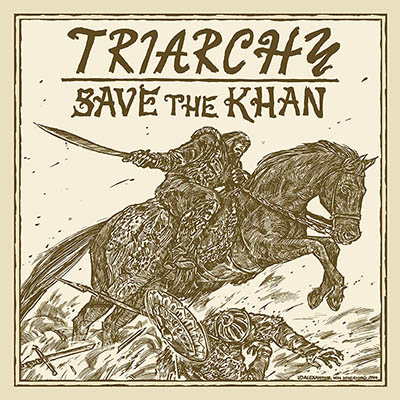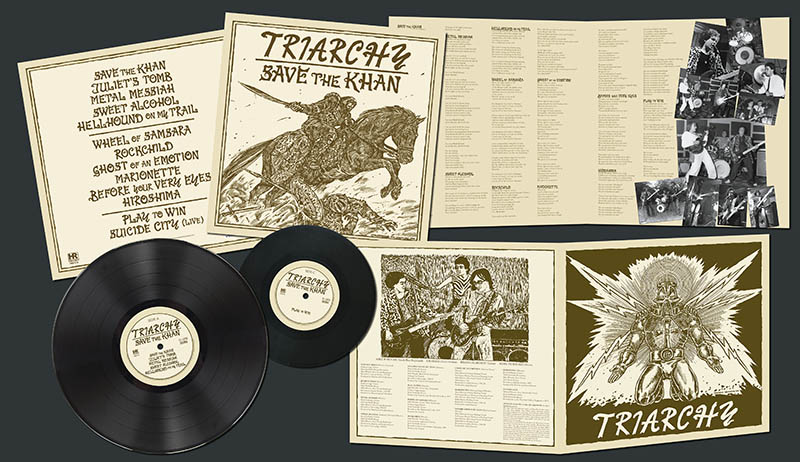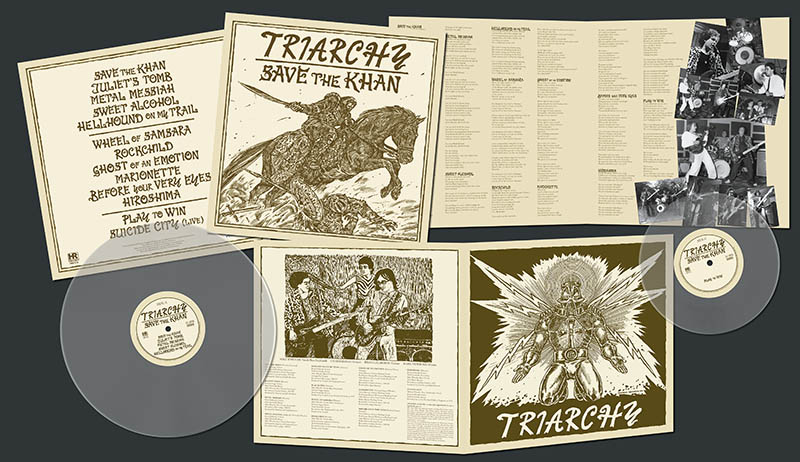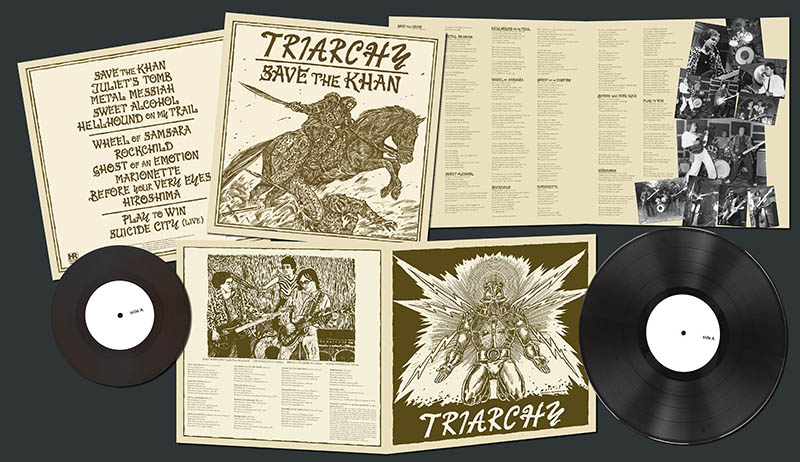 | ||||
| TRIARCHY - Save the Khan LP+7" | |
HRR 416, ltd 500, 150 x black + 350 x ultra clear vinyl, 425gsm heavy cardboard cover, 4 page insert, bonus 7" | |
| -Save the Khan -Juliet's Tomb -Metal Messiah -Sweet Alcohol -Hellhound on My Trail -Wheel of Samsara -Rockchild -Ghost of an Emotion -Marionette -Before Your Very Eyes -Hiroshima -Play to Win -Suicide City (live) | |
| SOLD OUT! | |
The ultimate Triarchy Anthology, remastered by Patrick W. Engel at Temple of Disharmony in October 2014!
A band like Triarchy definitely needs no long introduction. They are a true New Wave Of British Heavy Metal legend in their own right. Due to their unique sound, incorporating heavy use of keyboards, the band from Kent has secured their very own place in heavy metal history.
In 1979, Mike Wheeler (vocals, bass, keyboards), Graham Legg (guitars) and Mark Newbold (drums) released their debut single entitled »Save The Khan« (re-issued one year later), followed by the aptly titled 7” »Metal Messiah« in 1980. In 1983, the original band split up but over the years demand for Triarchy did not seem to wane.
As a result Vinyl Tap Records from Huddersfield issued a retrospective CD called »Before Your Very Ears« in 1995, followed by the limited vinyl album »Live To Fight Again« on High Roller Records (HRR 015).
As mentioned, »Live To Fight Again« was originally issued on High Roller Records in 2007. There were even talks of a live re-union. That was quite a while ago. Original drummer Mark Newbold explains what happened in the lives of the respective Triarchy members since: “Unfortunately, a band re-union after the release of »Live To Fight Again« in 2007 was not really feasible, and would have been rather difficult to arrange, due to work and family commitments and geographical locations, as Mike now lives in Scotland, about 500 miles north of Brian, Graham and me. I took up drumming again in 2010 to play with The Smokin’ Aces, a rock ‘n’ roll covers band, and had the privilege of playing at my twin daughters’ Prom Night. I also played in an occasional covers band that played a few charity gigs around that time. In 2013, I hung up my sticks, but could be tempted back behind a drum kit if the right opportunity came along. Brian Galibardy still plays occasionally with various bands in London, while Graham Legg is still a keen guitarist (although mainly confined to his bedroom). Mike is currently enjoying a very busy academic career as a philosopher at Stirling University.”
The new 13 track anthology album »Save The Khan« compiles everything Triarchy have ever recorded, including all songs from the two singles plus superb compositions such as “Rockchild”, “Ghost Of An Emotion”, “Before Your Very Ears” and “Hiroshima”.
As a special treat, there are two previously unreleased tracks on the album: “Play To Win” (according to drummer Mark Newbold “a reasonably straightforward mid-paced rock track”) as well as a live recording of a number called “Suicide City” (“a more innovatively-structured song with three distinct musical sections”). Mark Newbold explains in more detail: “‘Play to Win’ was recorded at the same session as the track ‘Wheel Of Samsara’ that appeared on »Live To Fight Again«. 'Suicide City' was also part of our set in those earlier days, but the version to be released now is a live version recorded at the Dartford YMCA in 1980, with the Galibardy-Newbold-Wheeler line-up.”
I always got the impression that Triarchy was quite different from most of the NWOBHM bands at the time, they had much more depth and much more quality. Mark Newbold elaborates on the main difference between Triarchy and most of the other bands at the time: “Although we were excited to be part of the NWOBHM movement, our music, ideology and style were quite a distance apart from the rest of the bands of that period. While Mike and I we were certainly listening to heavy/hard rock bands like Black Sabbath, Ted Nugent, Rush and UFO, we were also listening to numerous punk and new wave bands like The Clash, The Stranglers, Gang Of Four and Ultravox, as well as to acts like Iggy Pop and the Velvet Underground who had set the stage for punk. Our writing was partly shaped by these punk and new wave influences, and our use of keyboards definitely had more to do with Ultravox than, say, Deep Purple. Moreover, Brian was listening to country rock acts such as Little Feat and to urban and country blues guitarists, and that certainly comes through in his playing. It was the mix of these influences that resulted in our original sound.”
As mentioned earlier, Triarchy's sound was pretty heavily keyboard-flavoured but this never made them sound wimpy in any shape or form – which is unique. “The band’s sparse but effective use of keyboards often ran parallel to some very heavy power chords on tracks like ‘Save The Khan’ and ‘Metal Messiah’,” explains Mark Newbold. “In unison, this produced an impressive ‘wall of sound’, both in our recordings and also on stage. Some of us certainly had a soft spot for progressive, keyboard-based bands like ELP and Genesis, and for rock bands with prominent keyboards like Rainbow, but the way we used keyboards was definitely different. Mike was a bass player first and foremost, and, as he’ll be the first to admit, was never a good enough keyboard player to attempt any of that neo-classical stuff. Geddy Lee from Rush is definitely one point of contact but, as mentioned earlier, it was really the likes of The Stranglers and Ultravox – the new wave bands with keyboards – who tended to inspire us more in that area.”
However, a number like "Before Your Very Eyes" is kind of a departure from Triarchy's heavier style and almost sounds like synth pop/rock (a bit like U2 maybe). How comes, I ask Mark Newbold? “The final gig-playing line-up of Triarchy broke up in 1983. Mike then teamed up with Paul Gunn (drums, ex-Squeeze) and Mark Dawson (guitar, ex-NWOBHM band Legend), and they produced a small number of tracks, including ‘Ghost Of An Emotion’, ‘Before Your Very Eyes’ and ‘Marionette’ which are included on the Triarchy album »Before Your Very Ears«. Mark owned and ran the Goldust recording studio, which enabled the band to take its time in developing its recorded sound, and that explains some of the intricacy and complexity of the recordings they made. It was a major departure from the earliest Triarchy material, and indeed from what Legend had done. At that time, neither Mark nor Mike wanted simply to produce more heavy rock – although there’s obviously still a metal dimension to the songs – and they endeavoured to produce a sophisticated sound that was sometimes more pop rock than metal. Later on, Triarchy recorded 'Hiroshima' for the »Before Your Very Ears« album at Goldust, with Mark on the desk. Triarchy technically ceased writing and recording after the last line-up broke up in 1983. But then Mike, along with Paul Gunn and Mark Dawson, wrote and recorded ‘Ghost Of An Emotion’, ‘Before Your Very Eyes’ and ‘Marionette’. 'Marionette' was to have been included on »Live To Fight Again«, but on a vinyl album there are time constraints to each side of the record (approximately 22 minutes, I believe). So, regardless of whichever way we juggled the tracks, one side always ‘ran over’ time, so it was decided to omit the track. However, ‘Marionette’ has been included in these new High Roller releases along with the earlier piece ‘Play To Win’ (the Legg-Newbold-Wheeler line-up of Triarchy) and a live recording of ‘Suicide City’ (the Galibardy-Newbold-Wheeler line-up). These other two tracks have never been publicly released before, so it will be interesting to see how well they are received. It was somewhat annoying that ‘Marionette’ - chosen by we know not whom - ended up on the »Noise Level Critical« CD compilation, as it was neither one of our vinyl releases nor, in any deep way, representative of the band’s music in general. I don’t know whether this had anything to do with Vinyl Tap but, if any of the original band members had been asked to choose a track for the compilation, I am certain it would have been either ‘Save The Khan’, ‘Metal Messiah’, or ‘Hellhound’ On My Trail’.”
The mentioned "Hellhound On My Trail" is a cover tune by Robert Johnson as Mark Newbold explains in more detail: Yes, Robert Johnson wrote the track and recorded it in 1937, but died at the very young age of 29 under curious circumstances (possibly poisoning). He was an inductee of the 'Rock and Roll Hall of Fame', and was considered by some to be the 'Grandfather of Rock and Roll' influencing musicians such as Led Zeppelin, Bob Dylan, The Rolling Stones, Jimi Hendrix, and Eric Clapton, who called Johnson 'the most important blues musician who ever lived.' To sum up the influence Robert Johnson has had over latter day musicians - when Keith Richards was first introduced to Johnson's music by his Rolling Stones band mate Brian Jones, he replied: 'Who is the other guy playing with him?', not realising it was all Johnson playing on one guitar. Brian and Mike were both into blues music, and Brian’s style of play was heavily influenced by The Allman Brothers, Eric Clapton, Steely Dan and blues musicians like Robert Johnson, but although our version of ‘Hellhound’ is covered from the Johnson original, it is also, as you might imagine, very different, as it thunders along driven by a guitar structure that has only a subterranean presence in the original. At various times Triarchy line-ups played the following covers in addition to ‘Hellhound On My Trail’: ‘Cocaine’, ‘Sunshine Of Your Love’, ‘Superstition’ (yes, the Stevie Wonder track), ‘White Room’, ‘Johnny Porter’ (a Ry Cooder track), ‘Hey Joe’, ‘Search And Destroy’, ‘Kick Out The Jams’, ‘Whole Lotta Rosie’, ‘Black Night’ and ‘Paranoid’.”
"Rockchild", also to be found on »Save The Khan«, is a very straight, fast-forward heavy metal rocker. Quite a quick, snotty number with slight punk overtones. Would Mark Newbold subscribe to that description? It seems like it: “Yes, I’d describe it as a 'high octane burst of hard rock'. Its history is interesting. In between Brian Galibardy finally leaving the band and before Pete ‘Tabby’ Moore and Eddie Webb had joined, Mike and I had found an excellent guitarist named Justin (we can’t remember his surname now, I’m afraid) who joined and played with us, albeit for a brief period of time. Around this time we were approached by a local entrepreneur (for want of a better term). He had produced a compilation called »Kent Rocks« which included one song each from about ten local bands and had been distributed throughout the UK. When he approached us he was putting together »Kent Rocks 2«. The idea of a sort of showcase album appealed immensely, since no record deal or offers were on the horizon and the interest in ‘Metal Messiah’ was on the wane. We decided that a new guitarist and great tune, both would kick-start the band’s fortunes. So 'Rockchild' was recorded on 16th of June 1981 at the Mousehole studio in Orpington. Unfortunately, instead of a kick-start, we were given more like a kick up the arse, with Justin disappearing shortly after recording the track never to be seen again, and the so-called entrepreneur ‘legging’ it out of the country, with all the contributing bands’ master tapes. This double set back was compounded by not only being left with just cassette copies of this great track, but also having the ordeal and hassle of finding and recruiting another guitarist, although by this time, and with possibly ‘Rockchild’ in mind, we decided to take on two members to fill the guitar ‘void’. We were especially pleased that ‘Rockchild’ was finally set free from the Triarchy archive by High Roller Records, who managed to produce a great sounding version from nothing more than a cassette copy. Unfortunately, poor Justin will never get the recognition he deserves for some ace rhythm and solo work on 'Rockchild', as basically, we didn’t know who he was then, or where he is now.”
The two 7” singles Triarchy put out during their lifetime between 1979 and 1983 were of great quality. I am pretty sure a full-length Triarchy album would have gone down very well indeed. Mark Newbold gives us the whole story: “The first pressing of ‘Save The Khan’ (the one with the picture sleeve, just 1,000 copies) was entirely self-financed, although it was later repressed by Bullet Records without a picture sleeve. The recording of ‘Metal Messiah’ was again paid for by the band, while the pressing was paid for by Bullet. We were undoubtedly more than a little naïve in our dealings with the music industry, and were never professionally managed or contracted to a major record company. In hindsight, we should have gone straight to the major record companies for a deal after the success of ‘Save The Khan’, considering that the single charted in both the Heavy Rock and Independent charts in the ‘Sounds’ music paper, and was also receiving national airplay by some of the major rock DJ’s at the time. We got some great exposure. We featured in a centre page article in ‘Record Mirror’ titled ‘The New Boys of British Heavy Metal’, had a featured track in Geoff Barton’s weekly playlist in ‘Sounds’ and were even a clue in the paper’s crossword! Alan ‘Fluff’ Freeman played ‘Save The Khan’ and ‘Hellhound’ on his Capital Radio ‘Monday Rock Show’ in 1981, as did Tommy Vance, who after playing ‘Hellhound’ said, “… this band were going places”. And even John Peel, who generally played only new wave and punk music back then, aired ‘Save The Khan’ on his evening show. It was definitely a missed opportunity.”
Unfortunately, Triarchy also never really thought about recording their live set professionally. In fact we know of only two live recordings of the band,” states Mark Newbold, “one recorded at the Dartford YMCA, featuring the Galibardy-Newbold-Wheeler line-up, and one, recorded at The Electric Ballroom in Essex, featuring the Annal-More-Webb-Wheeler line-up. Both of these were recorded on portable cassette recorders. The version of ‘Suicide City’ on the High Roller album, is from the first of these recordings. Obviously, the quality is nothing compared to what you could do nowadays with the advancement in audio technology, but the engineer at High Roller has used the old, original cassette, and enhanced it, into a listenable state. We no longer have a copy of the second recording, which is a shame because it had the only recordings of some of our later tracks on it, including ‘Orange And Green’ (a song about the troubles in Northern Ireland with some great dual guitar work), ‘OD’d On Rock And Roll’ (an up-tempo rocker with some quirky chord structures), and covers of Iggy Pop’s ‘Search And Destroy’, the MC5’s ‘Kick Out The Jams’, and AC/DC’s ‘Whole Lotta Rosie’. We occasionally recorded our rehearsals on a portable cassette player, for us to listen to afterwards for arrangement purposes, but rarely recorded our gigs. With no record company or management, but a willingness to self-finance and promote ourselves, we tended to organise and set up our own headline gigs at pubs, clubs and at the large YMCA in Dartford, Kent. In South-East London we played most regularly at a pub called ‘The White Swan’ in Blackheath, run by the indomitable Valerie. Further out in Kent, we often played at a great venue called The Red Lion in Gravesend (which incidentally is still run by the same landlord, Terry), and also at the Royal Norfolk Hotel in Sandgate on the Kent coast (which was then a meeting place for bikers). In 1981 we supported Vardis at Chatham Town Hall, and in 1982 we supported the Swedish group, the EF Band, at the Electric Ballroom in Essex. Other gigs we played during that period included the Soundhouse in North London and Kent University.”
In addition to that, back in the early 1980s Triarchy also played some "Rock Against Racism" gigs. “'Rock Against Racism' was a campaign set up in the United Kingdom in 1976,” explains the Triarchy drummer, “as a response to an increase in racial conflict and the growth of white nationalist groups such as the National Front. The campaign involved pop, rock, punk and reggae musicians staging concerts with an anti-racist theme, in order to discourage young people from embracing racism. The campaign was founded, in part, as a response to statements and activities by well-known rock musicians that were widely regarded as racist. We were asked in [1978?"> if we wanted to support a reggae band (The Mighty Shades) at a gig in a community centre in Welling, Kent, in aid of 'Rock Against Racism'. It was a great opportunity for us to show our support for such a worthy cause, and given that it was in the National Front’s heartland, a very bold step by the organisers. The line-up then was Mike Wheeler, vocals/bass/keyboard; Mark Newbold, drums/percussion and Derek Lomas, guitar. Back then we were playing more quirky punk-pop songs rather than heavy metal/hard rock (although 'Hiroshima' was already in the set!), and the gig was a great success, ending with a finale of both bands playing together on stage, in a show of musical unity.”
The anthology album »Save The Khan« has been carefully re-mastered by Patrick Engel. Mark Newbold is delighted about how the material is sounding in 2015: “The remastered tracks sound great. They seem more dynamic sound-wise than the earlier versions. The recordings were always punchy, but now the songs really leap out at you.”
Matthias Mader


